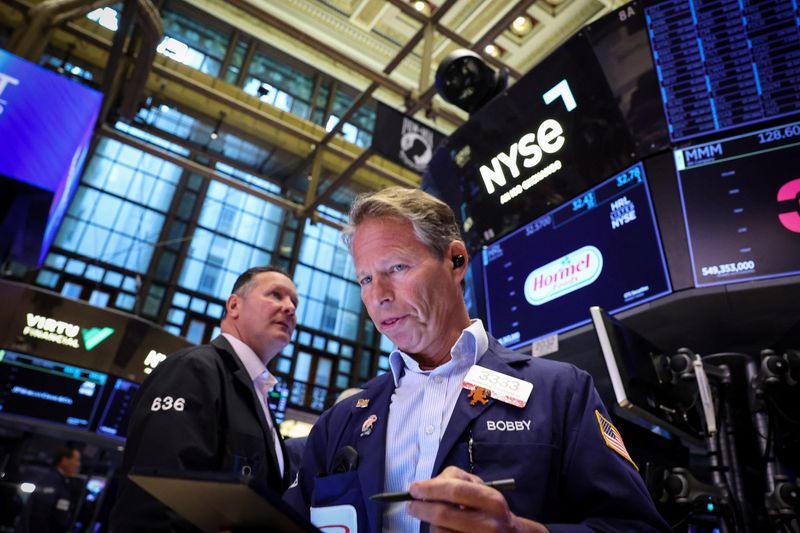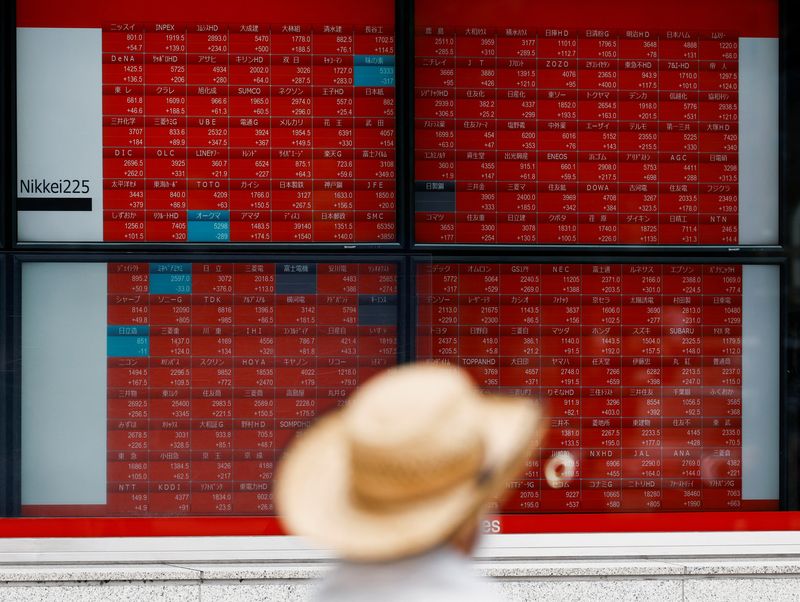By Sinéad Carew and Nell Mackenzie
NEW YORK/LONDON (Reuters) -MSCI's global equities index fell on Monday and the dollar rose as the Federal Reserve Chair Jerome Powell dampened hopes for another big rate cut, while oil futures ended flat after a choppy session on concerns about an escalating conflict in the Middle East.
Global benchmark Brent crude, however, posted its biggest monthly loss since November 2022 and its biggest quarterly drop in a year, slumping 17% in the third quarter, as waning global demand concerns overshadowed fears of the conflict curtailing supply.
Stock trading was choppy after the Powell suggested that the central bank was not in a hurry to cut rates. While some investors had been betting on more substantial easing, Powell signalled that the Fed would make two 25 basis point cuts this year if the economy evolves as expected.
"That sounded less dovish than the market had priced in. There were some expectations for a 50 basis point cut by the end of the year. That comment probably took it off the table," said Robert Phipps, a director at Per Stirling Capital Management in Austin, Texas.
Wall Street indexes had rallied last week with help from a benign reading on core U.S. inflation on Friday that had boosted bets for another half-point rate from the Fed.
But on Monday traders saw a 36.7% probability of a 50 basis point cut in November, down from 53.3% on Friday, according the latest reading on CME Group's (NASDAQ:CME) FedWatch tool.
While stocks fell during Powell's speech, they regained lost ground with the S&P 500 and the Dow registering record closing highs on the last day of the quarter when many traders make last minute adjustments to their portfolios.
"The price increases at the end of the day were probably due in part to quarter-end-window dressing," said Rick Meckler, partner, Cherry Lane Investments, a family investment office in New Vernon, New Jersey.
The Dow Jones Industrial Average rose 17.15 points, or 0.04%, to 42,330.15, the S&P 500 rose 24.31 points, or 0.42%, to 5,762.48 and the Nasdaq Composite rose 69.58 points, or 0.38%, to 18,189.17.
For the month, the S&P 500 gained 2.01% and for the quarter it rose 5.53%.
MSCI's gauge of stocks across the globe fell 1.82 points, or 0.21%, to 851.02 for the day. For the month the global index was showing an increase of around 2% and for the quarter it was registering a gain of around 6%.
Along with the Fed commentary, Per Stirling Capital's Phipps said that investors were monitoring the Middle East fighting and devastation from Hurricane Helene, as well as an impending strike by U.S. port workers and news from China.
In Beijing's trading day, equities had rallied sharply after China's latest round of stimulus.
China government stimulus measures announced last week continued to boost stock markets, with the blue-chip CSI300 closing up 8.5%, its biggest daily gain since 2008 adding to its 25% run-up in the last five trading sessions.
The dollar rose after Powell's more hawkish tone lead traders to pare bets for a big rate cut in November.
"He took his hawkish pills,” said Steve Englander, head, global G10 FX Research and North America macro strategy at Standard Chartered (LON:STAN) Bank's NY Branch suggesting that the market may be "beginning to worry that they're serious about doing 25 (basis point cuts)."
The dollar index, which measures the greenback against a basket of currencies including the yen and the euro, rose 0.32% to 100.76.
The euro was down 0.27% at $1.1133 while against the Japanese yen, the dollar strengthened 1% to 143.61.
In Treasuries, the yield on benchmark U.S. 10-year notes rose 3.6 basis points to 3.785%, from 3.749% late on Friday.
The 2-year note yield, which typically moves in step with interest rate expectations, rose 7.4 basis points to 3.637%, from 3.563% late on Friday.
And a closely watched part of the U.S. Treasury yield curve measuring the gap between yields on two- and 10-year Treasury notes, seen as an indicator of economic expectations, was at a positive 14.6 basis points.
In energy markets, U.S. crude settled down 1 cent at $68.17 a barrel, but tumbled 7% in September in its biggest monthly decline since October 2023, and slumped 16% in its biggest quarterly drop since the third quarter 2023.
Brent edged down 21 cents to $71.77 per barrel. It posted a roughly 9% drop in September, its biggest decline since November 2022 and its third consecutive monthly loss, along with a near 17% quarterly drop, also its biggest in a year.

Gold eased, taking a breather after a historic rally driven by U.S. monetary easing and heightened Middle East tensions, which puts it on course for its biggest quarterly gain since early 2020.
Spot gold fell 1% to $2,631.39 an ounce. U.S. gold futures fell 0.54% to $2,629.90 an ounce.
